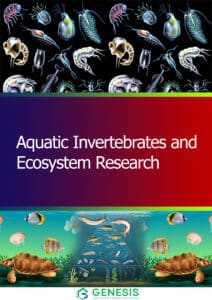
Join the Reviewer Team: Aquatic Invertebrates and Ecosystem Research (AIER)
Genesis Publishing Consortium Limited (GPCL) is actively seeking individuals of exceptional caliber to join our
Aquatic Invertebrates and Ecosystem Research (AIER) extends an open invitation for submissions of high-caliber scientific papers within the domain of aquatic invertebrates, ecosystem science, and research. As a distinguished platform, AIER provides an avenue for researchers, academics, and practitioners to disseminate their innovative findings and contribute significantly to the dynamic and ever-evolving field.
AIER welcomes submissions that span a broad spectrum of topics, embracing the intricate tapestry of aquatic invertebrates, ecosystem science, and research. From the taxonomic intricacies of invertebrate species to the complex dynamics of aquatic ecosystems, AIER seeks to uncover the mysteries of aquatic life and its interactions with the environment. Authors are encouraged to explore, but not limited to, the following areas:
Taxonomy and systematics: Delve into the classification and evolutionary relationships of aquatic invertebrates, unraveling the intricacies of their genetic makeup and morphological features.
Ecology and behavior: Investigate the behavioral patterns and ecological roles of aquatic invertebrates within their natural habitats, shedding light on their interactions with other organisms and the environment.
Physiology and adaptations: Explore the physiological mechanisms and adaptive strategies that enable aquatic invertebrates to thrive in diverse aquatic environments, from freshwater streams to deep-sea trenches.
Habitat preferences and distribution: Examine the habitat preferences and distribution patterns of aquatic invertebrates, elucidating the factors that influence their spatial distribution and abundance.
Biodiversity and conservation: Assess the biodiversity of aquatic invertebrate communities and evaluate conservation strategies aimed at preserving their habitats and protecting endangered species.
Ecological interactions: Investigate the complex network of ecological interactions among aquatic invertebrates, including predation, competition, symbiosis, and mutualism.
Pollution and environmental health: Evaluate the impact of pollution and environmental degradation on aquatic invertebrate populations and ecosystem health, identifying potential mitigation measures.
Monitoring and assessment: Develop innovative methods for monitoring and assessing the ecological status of aquatic ecosystems, using aquatic invertebrates as bioindicators of environmental quality.
Management and restoration: Propose management strategies and restoration techniques for the sustainable management of aquatic ecosystems and the conservation of aquatic invertebrate biodiversity.
Evolutionary ecology: Explore the evolutionary processes shaping the diversity and adaptation of aquatic invertebrates, unraveling their evolutionary history and genetic diversity.
Biogeography and dispersal: Investigate the biogeographic patterns and dispersal mechanisms of aquatic invertebrates, elucidating the factors influencing their distribution and dispersal abilities.
Trophic interactions and food webs: Analyze the trophic interactions and food web dynamics of aquatic ecosystems, tracing the flow of energy and nutrients through complex ecological networks.
Reproductive biology and life history strategies: Investigate the reproductive biology and life history strategies of aquatic invertebrates, unraveling the mechanisms underlying their reproductive success and population dynamics.
Ecotoxicology and contaminant bioaccumulation: Assess the ecotoxicological effects of contaminants on aquatic invertebrates, examining their bioaccumulation, biomagnification, and ecological consequences.
Climate change impacts and resilience: Evaluate the impacts of climate change on aquatic invertebrate populations and ecosystems, identifying strategies for enhancing their resilience and adaptation.
Invasive species ecology and management: Investigate the ecological impacts of invasive species on native aquatic invertebrate communities and develop management strategies for their control and eradication.
Citizen science and community engagement: Explore the role of citizen science and community engagement in aquatic invertebrate research and conservation, fostering public awareness and participation.
Molecular ecology and genomics: Apply molecular ecology and genomics techniques to study the genetic diversity, population structure, and evolutionary history of aquatic invertebrates.
Restoration ecology and habitat enhancement: Develop innovative approaches for habitat restoration and enhancement to support aquatic invertebrate biodiversity and ecosystem function.
Socio-ecological systems and stakeholder engagement: Examine the social and economic dimensions of aquatic invertebrate conservation and management, engaging stakeholders in decision-making processes.
Interdisciplinary approaches and synthesis studies: Foster interdisciplinary collaborations and synthesis studies to address complex research questions and integrate multiple sources of data and knowledge.
Emerging challenges and future directions: Identify emerging challenges and future research directions in aquatic invertebrate ecology and ecosystem science, paving the way for innovative research and conservation strategies.
Authors are invited to submit original research papers, review articles, case studies, and short communications that address the aforementioned topics or any related field within aquatic invertebrates, ecosystem science, and research. To ensure the highest quality of published content, submissions must adhere to the following guidelines:
Submission of manuscripts is facilitated through the AIER online submission system. For any inquiries or assistance regarding the submission process, authors are encouraged to contact the editorial team at editor.aier@genesicpcl.com.
Join us in our collective endeavor to advance knowledge and understanding in the realm of aquatic science and sustainability. We eagerly await your submissions and anticipate the opportunity to share groundbreaking discoveries with our global audience.
Dr. Hadi Hamli
Editor-in-Chief
Aquatic Invertebrates and Ecosystem Research
4915 Columbia Rd
Columbia, Maryland 21044
United States of America
Email: editor.aier@genesicpcl.com

Genesis Publishing Consortium Limited (GPCL) is actively seeking individuals of exceptional caliber to join our

Genesis Publishing Consortium Limited (GPCL) is actively seeking individuals of exceptional caliber to join our
Get updates on special events
Genesis Publishing Consortium Limited (GPCL) is an Open Access publisher, with more than 7 online, peer-reviewed journals covering a wide range of academic disciplines.